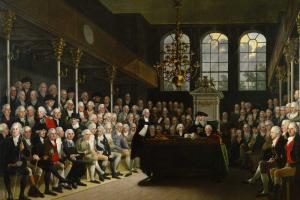1790
Alternative title
Summoned
Assembled
Dissolved
Session
Dates
Long description
At the dissolution in June 1790, George III seemed to have recovered from the bout of insanity which had caused a political crisis over the issue of a regency in the winter of 1788-9. His 31-year-old prime minister, William Pitt, had been in office for six and a half years, and was at the summit of his power, master of the Commons and the cabinet. By the time this Parliament was dissolved in May 1796, Britain was in its fourth year of war with revolutionary France, Pitt’s plans for restoring the national finances had been shelved, and a major political realignment had occurred as the Whig opposition, led in the Commons by Charles James Fox, was fractured by the impact of the revolution and war.
The 1790 general election ran from 16 June until 28 July. Ninety-two of the 314 constituencies (29 per cent) were contested, an increase of five on the figure for 1784; the longest and most expensive contest was in County Durham. Despite an unprecedented level of orchestration of resources by the opposition, directed by William Adam, the outcome was a strengthening of the ministry’s already powerful position in the House: in crude terms, the 558 Members might be classed as 340 government, 183 opposition, and 35 independent or doubtful. The number of Members returned who had no previous parliamentary experience was 124 (22 per cent). At by-elections during the life of this Parliament, 114 new Members came in.
Opposition mustered 173 votes (to the government’s 253) in April 1791 against Pitt’s ultimatum to Russia over her occupation of Oczakov; but as the revolution in France took an increasingly violent course and the threat to the European monarchies intensified in 1792, the leaders of the opposition became irrevocably divided. While Fox, together with younger Whigs active in the Society of the Friends of the People, notably Charles Grey, Richard Brinsley Sheridan, George Tierney and Samuel Whitbread, opposed war with France, the more conservative majority, under the party’s titular leader, the 3rd duke of Portland, espoused the alarmism which had been propagated in print and in the House since 1790 by the former Rockinghamite Edmund Burke, who with William Windham formed a ‘third party’ to support the government as France declared war in February 1793. The old opposition was splintered, and the Foxites were reduced to a predominantly aristocratic rump of about 65 Members. It was not until July 1794, however, that the Portland Whigs and Windham formally coalesced with Pitt’s ministry: Portland, Windham and Lords Fitzwilliam, Mansfield and Spencer were taken into the cabinet, joining the former Whig Lord Loughborough, who had been recruited as lord chancellor in 1793.
On 9 May 1792 a pair of burning breeches, supposedly crammed with combustibles, was discovered in a water closet. Alarmists suspected a Jacobin plot, and the fear of sedition and insurrection that prevailed in the establishment during this Parliament was reflected in significant coercive and repressive legislation. An Act to suspend habeas corpus became law on 23 May 1794; and a minor attack by stone on the king’s coach was made the pretext in late 1795 for measures to deal with treasonable and seditious practices and to outlaw seditious meetings.
The debates of 13-28 Dec. 1792 publicly exposed the divisions in the Whig opposition, as Fox, supported by Sheridan, clashed with Burke. In a dramatic, yet slightly ludicrous episode in the debate on the aliens bill, 28 Dec., Burke threw to the floor a ‘revolutionary’ dagger manufactured in Birmingham, in protest against ‘the introduction of French principles and French daggers’. To the consequent laughter and calls for a fork, Burke replied, ‘When you smile, I see blood trickling down your face’. Fox, Burke, Sheridan (whose five-hour speech against Warren Hastings in 1787 had set the tone) and Pitt were the supreme exponents of the florid and prolix oratory that had become the fashion.
The Commons chamber (St. Stephen’s chapel) as it existed during this Parliament was depicted by the artist Karl Anton Hickel in two pictures showing Pitt and Fox respectively addressing the House, with identifiable portraits of many of the Members.
Further Reading
Donald E. Ginter, Whig Organization in the General Election of 1790 (Berkeley, California, 1967)
F. O’Gorman, The Whig Party and the French Revolution (1967)

